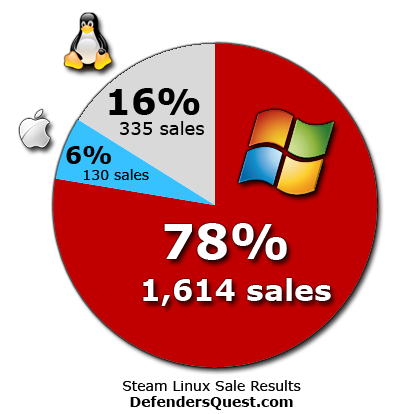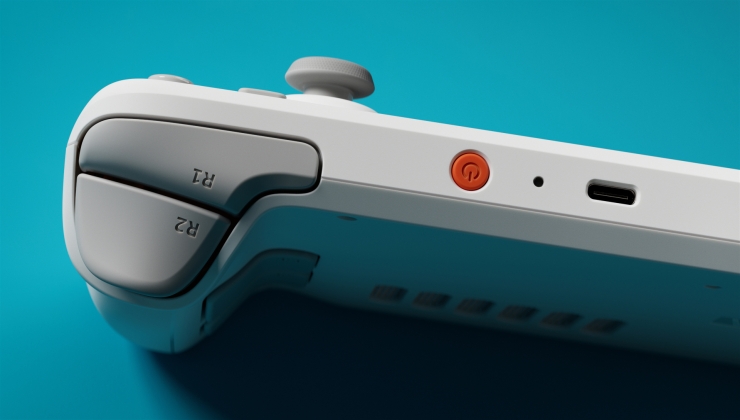If you are a regular visitor of this site, you probably want your Steam purchase to be counted as a Linux sale. But how does Steam actually consider you to be a Linux buyer? It's trickier than you think.
The described methodology comes from Defender's Quest Steam sale results blogpost from Lars Doucet, who asked Valve about this. There doesn't seem to be any official information posted about this anywhere, but there's no reason not to believe the blogpost. The methodology is:
QuoteMac/Linux sales are based on platform of purchase; or after 7 days, the platform with the most minutes played.
As you can see, there are several things to keep in mind, if you want your sale to count towards Linux purchases:
- Always try to buy the game from Linux, either Steam client running on Linux, or a web browser running on Linux. The platform of purchase is the default indicator of which platform the sale was intended for. So, for example, instead of buying the game from work (using Windows), wait and buy it at home (using Linux).
- The number of minutes played on each platform is evaluated 7 days after the purchase was made, and the platform with most minutes played is considered the final platform of sale. This step is ignored only if you haven't played the game during the week at all (all platforms have 0 minutes played), in that case the platform of purchase decides. Otherwise, the platform with most minutes played wins. This is very good to keep in mind especially if you decided to play this game on Windows instead of Linux (e.g. the Linux version doesn't work well on your system). If you want your purchase to count as Linux, Linux needs to have the most minutes played after 7 days. So you either need to wait a week before spending a lot of time in this game on Windows, or come up with some other solution (leaving the game running in the main menu in order to bump up the played time on Linux counts).
- On the 7th day after purchase, the target platform decision has been made, it's final, and it won't be ever changed. So, as the blogpost states, if you buy the game, play a few minutes on Windows just to test it, and then invest 60 hours on Linux into it after a few weeks... sorry, still counted as a Windows sale.
This was also echoed by Icculus earlier this year:
QuoteInstall and play it on Linux for the first week after you buy it and they consider it a Linux sale.
Source
I hope this helped people a bit to understand how the platform sale numbers work in Steam. I think we possibly lose quite a few Linux sales in statistics because people are not informed about the methodology. It certainly happened to me in the past, e.g. buying the game from Windows and then playing it on Linux a month later. Hopefully, more informed Linux gamers could mean more accurate statistics in the future :-)
Editorial Note
While this is how Steam calculates sales and certainly how porting houses like Feral or Aspyr are rewarded, some smaller developers may look at things like number of players or number of downloads and use this information as a basis on the market potential that Linux has for future ports. That said, it's never a bad idea to buy games after the Tux icon appears.





 How to set, change and reset your SteamOS / Steam Deck desktop sudo password
How to set, change and reset your SteamOS / Steam Deck desktop sudo password How to set up Decky Loader on Steam Deck / SteamOS for easy plugins
How to set up Decky Loader on Steam Deck / SteamOS for easy plugins
Anyway, this is very unfortunate because I have bought a number of games in part because of Linux support and before all the talk about what counts as a Linux sale, I played a number of them on Windows. Maybe even a few were purchased on Windows.
They really need real-time polling for which operating system people play a game on, not this set in stone crap. This is hurting the appeal of Linux, especially when people build up their Linux game library before fully switching to Linux, ever really using Linux or if they still dual boot. Developers and publishers need to see where players are going, not just where they were.
Change the user agent in your browser to pretend it's running on Linux? ;-)
I didn't even think about that...thanks for the tip.
You could use VNC to access your home machine for buying them while at work, or alter your browser's User-Agent string to the linux version of the browser you're using prior to purchase (see: [list of user agent strings for various browsers](http://udger.com/resources/ua-list) - click on your browser [or the browser you want to be identified as], then look for the user agent string that includes "Linux x86_64" or something). Some browsers support altering the User-Agent string natively, but most require an extension of some sort ([Firefox](https://addons.mozilla.org/en-US/firefox/addon/user-agent-overrider/), [Chrom(e|ium)](https://chrome.google.com/webstore/detail/user-agent-switcher/ffhkkpnppgnfaobgihpdblnhmmbodake?hl=en)).
Alternatively, just make sure you install and play all games on a linux machine for at least a couple of minutes in those first seven days.
Chrome doesn't require an extension/plugin just use the Developer Tools (Just have to know the String). I have already looked into it since I didn't even think about it (damarrin beat you to the punch), in the past I typically only use that feature for checking website code on different browsers instead of different platforms as well.
Also when gifting games I can't play them first..but for my personal collection yes that works fine as well...as long as there is already a Linux Port.
Here's a nice quote from a developer who has a game on Steam that doesn't support Linux about the type of sales data they can see:
From that [same reddit parent thread](http://www.reddit.com/r/linux_gaming/comments/2fjnph/how_do_i_make_sure_that_a_game_ive_bought_from/ck9zd35):
So not sure if it's you must ONLY play on Linux for the 1st week or you must play MORE on Linux than any other platform otherwise, it'll still default to Windows if you bought it on Windows.
Oh wait, same thread:
So I guess this GoL article is right. =)
The stuff you're quoting is about getting third parties like Aspyr payed (which is important, of course), not about what stats are visible to developers/publishers (and Aspyr as well, I imagine) - that's the distinction that I'm trying to highlight.
I haven't yet found anybody who's been able to confirm that that first week platform assignment figure is even viewable in the Steamworks stats stuff (I am asking around though and will report back with what I come up with), but either way, developers/publishers can see and probably rely on stats beyond the stuff that the article talks about.
If you're able to find out the details, please report back, that would be very interesting.
Good idea! There's another advantage to that, you'll get to see games filtered for Linux by default.
Thanks for clearing that up!
I guess I won't be purchasing my games from the "mobile" client unless I intend to download/play them in the next seven days then... Though after reading this, it's almost discouraging to purchase games from the "mobile" client at all!
It's pretty unfair that sales "default" to Windows when purchased from the "mobile" client, particularly when you're talking about gamers whom only play using Linux-based operating systems...
I agree - this article answers a lot of questions... But there's just as many questions that remain unanswered.
Clarity from Valve Software would eliminate that issue...